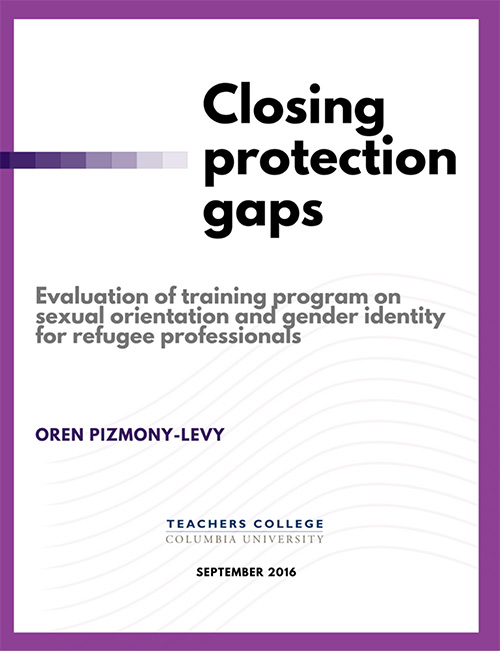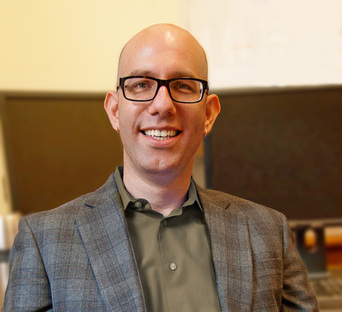TC Survey of Refugee Workers: Attitudes Toward Lesbian, Gay, Bisexual, Transgender and Intersex Refugees Can be Changed Through Education and Training

However, this first survey of refugee professionals also found that their attitudes can be changed and competencies can be developed through effective education and training. The complete survey can be viewed here.
“The survey gave us information about current attitudes among professionals who work with lesbian, gay, bisexual, transgender and intersex (LGBTI) refugees, and it told us that there is a way to change people to do it better,” said the survey’s author, Oren Pizmony-Levy, assistant professor of International and Comparative Education.
[NOTE: On Sunday, September 18, Pizmony-Levy and Neil Grungras, Founder and Executive Director of ORAM, will hold a briefing and Q&A session about the report at Teachers College from 4:30 to 7 p.m. in Room 179, Grace Dodge Hall.]
Commissioned by ORAM (Organization for Refuge, Asylum & Migration)—a leading international advocate for the world’s most vulnerable refugees—the survey examined refugee workers’ knowledge, opinions and feelings about sexual orientation and gender identity, both before and after participation in a training program. The survey reached three major findings:
- Professionals’ attitudes toward LGBTI people can influence their impartiality on the job. Among respondents who are more accepting of homosexuality, 75 percent said they include or are very likely to include LGBTI issues in the work of their organization; this figure drops to 30.5 percent among respondents who said they were less accepting of homosexuality.
- Professionals’ contact with LGBTI people can influence their engagement with LGBTI refugees.Refugee workers who know LGBTI people (for example, close friends or relatives) reported feeling more comfortable and more prepared to serve LGBTI refugees. Moreover, participants in the ORAM workshop indicated that having openly LGBTI trainers contributed to their learning.
- Education and training can improve the quality of services to LGBTI clients. Pizmony-Levy studied the effectiveness of ORAM workshops in which refugee workers learned about the mistreatment of LGBTI refugees in their native countries. In surveying the 799 refugee workers who took part in the training workshops, he found that training and education about LGBTI issues helped to improve their engagement with LGBTI refugees.

“The workshop was based on the understanding that sensitized, empathetic, and educated refugee professionals are able to adjudicate claims accurately and to better protect sexual and gender minority refugees,” Pizmony-Levy writes.
For example, before training, only 10.8 percent of those surveyed said they had seen posters or artwork in public areas of their offices designed to help convey a welcoming message to LGBTI refugees. Three months following completion of the workshop, 68.8 percent reported seeing the posters and artwork – partially because ORAM had provided them to hang in their offices, Pizmony-Levy said in an interview. Before the training, 22.5 percent said they include LGBTI issues in the work of their organization; after the training this figure increased to 38.5 percent.
The need for education of refugee workers about LGBTI issues and the protection available to them was demonstrated in the preliminary survey of refugee workers before they participated in ORAM’s training workshops. In that preliminary survey, nearly half of the participants said they were not familiar with current interpretations of the Geneva Convention Relating to the Status of Refugees, which conclude that LGBTI refugees can be considered members of a particular social group who are entitled to protection from persecution based on their sexual orientation and gender identity and expression.
“This is telling us that ideas formed by the international community about the need to protect LGBTI people are not necessarily trickling down,” Pizmony-Levy said, “so we have some work to do.”
Teachers College administered the 51-question survey to a non-random sample of 1,044 refugee professionals, including medical or mental health professionals, social workers, legal advisers, intake workers, receptionists and interpreters, in 11 countries: Australia, India, Israel, Jordan, Kenya, Malaysia, Malta, Senegal, Trinidad, Turkey and the United States. Refugee workers were surveyed from 2013 to 2016. Recent PhD graduates Christine Jang, Megan Jensen and Michael Ramsey worked on the survey.
Of the 1,044 refugee workers originally surveyed, 799 refugee workers subsequently took part in ORAM workshops designed to increase their knowledge and sensitivity to LGBTI issues. Teachers College surveyed the workshop participants six weeks and three months following the training, and compared their responses to those given before the training.
Published Friday, Sep 16, 2016